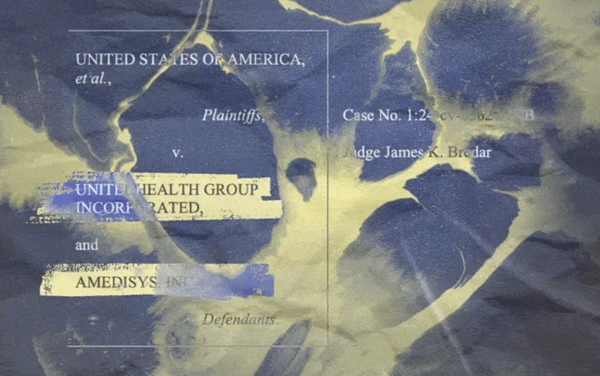Cannibalism At The Pharmacy Counter
By Joey Rettino and Wendell Potter
August 27, 2025
 UnitedHealth Group’s latest $3.3 billion mega-purchase of home health and hospice giant Amedisys will come with strings attached. Last week, the U.S. Department of Justice and four state attorneys general announced that UnitedHealth must sell off 164 home health and hospice locations in 19 states to address antitrust concerns over the merger.
UnitedHealth Group’s latest $3.3 billion mega-purchase of home health and hospice giant Amedisys will come with strings attached. Last week, the U.S. Department of Justice and four state attorneys general announced that UnitedHealth must sell off 164 home health and hospice locations in 19 states to address antitrust concerns over the merger.
The government’s case was straightforward: letting UnitedHealth absorb one of its biggest competitors in the home health space (just two years after swallowing LHC Group) would further concentrate an already shrinking market, reducing competition for both patients and workers. These 164 divested sites, generating roughly $528 million annually, will go to two other companies, BrightSpring Health Services and The Pennant Group.
BrightSpring Health Services is a large home-and-community-based complex and chronic care provider and The Pennant Group is a growing company in the post-acute care landscape.
The Department of Justice’s Antitrust Division and state co-plantiffs’, proposed settlement.
Justice Department Antitrust Division head Abigail Slater called the deal a win for patients and nurses:
“In no sector of our economy is competition more important to Americans’ well-being than healthcare. This settlement protects quality and price competition for hundreds of thousands of vulnerable patients and wage competition for thousands of nurses. I commend the Antitrust Division’s Staff for doggedly investigating and prosecuting this case on behalf of seniors, hospice patients, nurses, and their families.”
This settlement is also notable for another reason: it shows the DOJ is looking closely at UnitedHealth Group’s vast, vertically integrated empire, which is exactly what the team at the Center for Health & Democracy just spent over a year mapping. In our Sunlight Report on UnitedHealth Group, we documented nearly 2,700 subsidiaries operating in insurance, pharmacy benefit management, physician practices, surgery centers, data analytics and more.
But it’s also important to note, as The American Economic Liberties Project (AELP) points out, that the deal is not all good. Emma Freer, Senior Policy Analyst for Health Care at AELP said in a statement:
“The DOJ was right to challenge this deal, which would eliminate head-to-head competition that lowers costs, improves care quality, and betters working conditions for nurses and other caregivers.
This settlement abandons that goal and caves to UnitedHealth Group, one of the most dangerous monopolists in American health care. It claims to divest home health and hospice care providers in overlapping markets but, in actuality, cedes them to similarly conflicted buyers, including a highly-leveraged private-equity firm. As a result, Big Medicine will profit at the expense of vulnerable hospice patients, some of whom will pay with their lives, and the workers who care for them.”
As for UnitedHealth Group specifically, the DOJ’s action here doesn’t unwind the empire, but it does…
[READ THE COMPLETE ARTICLE HERE]
